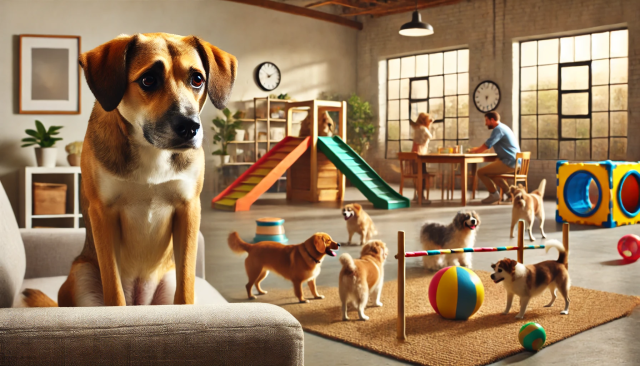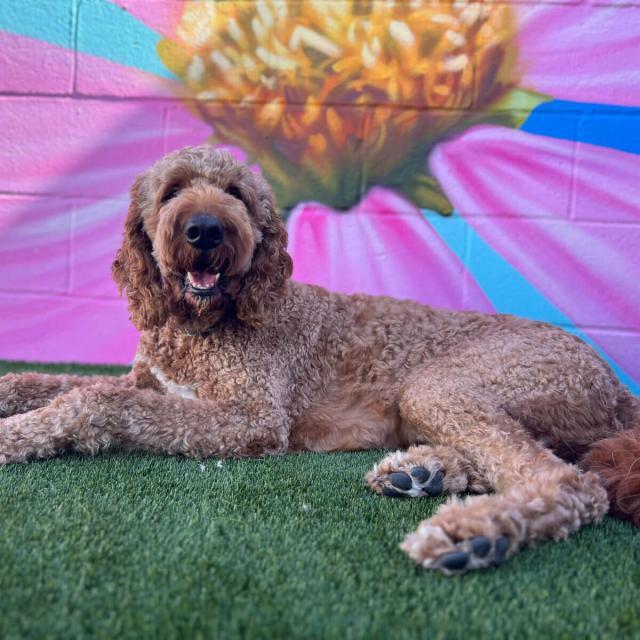Dog daycare has become an increasingly popular option for busy pet parents in Baltimore. It provides dogs with socialization, exercise, and mental stimulation while giving owners peace of mind that their furry friends are well cared for. However, one of the biggest questions pet owners face is: How often should my dog go to daycare?
The answer isn’t one-size-fits-all. Some dogs thrive with daily daycare, while others do best with just a day or two per week. The right schedule depends on your dog’s personality, health, and lifestyle. In this guide, we’ll break down the key factors to consider and help you determine the best doggie daycare routine for your pup.
Factors That Determine Daycare Frequency
1. Your Dog’s Personality & Energy Levels
Every dog has a unique personality, and this plays a big role in determining how often they should attend doggie day care.
- High-energy breeds (like Border Collies, Labradors, and Huskies) often benefit from more frequent daycare visits to burn off energy and prevent boredom-related behaviors.
- Low-energy breeds (like Bulldogs, Basset Hounds, and Shih Tzus) may only need occasional daycare to stay social without becoming overstimulated.
- Social butterflies that love playing with other dogs might thrive in doggie daycare in Baltimore several times a week.
- Independent or shy dogs may prefer a more limited schedule to avoid stress from too much interaction. If your pup is nervous, check out our guide on How to Introduce a Nervous Dog to Daycare.
Understanding your dog’s energy levels and personality will help determine whether daycare should be an occasional treat or a regular routine.
2. Your Dog’s Age & Health Condition
A dog’s age and health status significantly impact their daycare needs.
- Puppies (Under 1 Year Old): Puppy daycare benefits young dogs by providing valuable socialization and helping them develop confidence around other dogs. However, they also need rest, so starting with 1-3 days a week is usually ideal. Read our How to Prepare Your Dog for Their First Day at Dog Daycare to ensure a smooth transition.
- Adult Dogs (1-7 Years Old): Healthy adult dogs can handle daycare more frequently, with many thriving on 2-4 days per week, depending on their energy levels.
- Senior Dogs (7+ Years Old): Older dogs may enjoy dog daycare but may also need more downtime. A couple of shorter sessions per week may be enough, especially if they have joint issues or reduced stamina.
If your dog has health concerns, consult your veterinarian to determine a schedule that won’t overexert them.
3. Your Work & Lifestyle Schedule
Your availability and daily routine also influence your dog’s doggie day care in Baltimore schedule.
- Full-time workers often enroll their dogs in daycare 3-5 times a week to ensure they get adequate exercise and companionship.
- Remote workers may only need daycare 1-2 times a week as a way to give their dog social time while they focus on work.
- Traveling professionals might opt for daycare plus dog hotel boarding services when they’re out of town.
Finding a balance between your schedule and your dog’s needs is key to maintaining their happiness and well-being.

Separation Anxiety & Behavioral Needs
Dogs with separation anxiety or behavioral challenges may benefit from a structured daycare routine.
- If your dog struggles with being left alone, more frequent daycare visits can help ease their anxiety by keeping them engaged.
- Dogs that are overly clingy at home may benefit from daycare to build confidence and independence.
- If your pup has behavioral issues (like excessive barking, destructive chewing, or nervousness), daycare can provide positive social experiences that reduce stress.
That said, if your dog is reactive or fearful, daycare might not be the right fit. In these cases, professional training and smaller playgroups may be better alternatives.
How Many Days a Week is Ideal?
1. Occasional Visits (1-2 Days a Week)
Best for:
✅ Independent, low-energy, or older dogs.
✅ Dogs with alternative exercise/play options.
✅ Pet parents who work from home and need occasional relief.
2. Regular Attendance (3-4 Days a Week)
Best for:
✅ High-energy breeds needing consistent socialization.
✅ Dogs who get bored or destructive when left alone.
✅ Pet parents with full-time jobs who want a balanced routine.
3. Full-Time Daycare (5 Days a Week)
Best for:
✅ Extremely social or high-energy dogs.
✅ Dogs with severe separation anxiety.
✅ Pet parents with long work hours or frequent travel.
Potential downside: Too much daycare can overstimulate some dogs, leading to fatigue or stress. If you notice signs of exhaustion (e.g., excessive sleeping, irritability), consider reducing their daycare days.
What to Look for in a Doggie Daycare
Choosing the right doggie daycare is essential to ensure your pet’s safety, happiness, and well-being. Here are key factors to consider when selecting a daycare:
- Clean and Safe Facilities – Look for a daycare that maintains a hygienic and secure environment with proper fencing and play areas.
- Experienced and Caring Staff – A good daycare should have trained professionals who understand dog behavior and can properly supervise playgroups.
- Structured Playtime and Rest Breaks – Dogs should have a balance of activity and downtime to prevent overstimulation.
- Small Playgroups by Size and Temperament – Grouping dogs appropriately helps minimize stress and ensures a positive social experience.
- Emergency Protocols and Safety Measures – Ask about staff training for medical emergencies and how they handle any behavioral issues.
At The Canine Club, we prioritize safety and fun for all pups. Learn more about how we keep dogs happy and engaged in our blog: Dog Daycare & Socialization: Helping Your Dog Stay Confident, Happy & Active at The Canine Club.

Signs That Your Dog Needs More (or Less) Daycare
Signs Your Dog Might Need More Daycare:
✔️ Excessive energy at home, even after walks.
✔️ Destructive behaviors like chewing furniture.
✔️ Signs of boredom (e.g., pacing, whining).
✔️ Increased excitement when heading to daycare.
Signs Your Dog Might Need Less Daycare:
❌ Coming home exhausted or cranky.
❌ Avoiding interactions with other dogs.
❌ Stress-related behaviors (e.g., hiding, excessive licking).
❌ Reluctance to go inside the daycare facility.
If you notice any of these signs, adjust your dog’s daycare schedule accordingly. Some dogs need a break between visits to recharge, while others thrive on daily play.
Alternatives to Doggie Daycare
Daycare isn’t the only option for keeping your dog engaged. If you’re looking for alternatives, consider:
- Dog Walkers – A great way to ensure your dog gets midday exercise while you’re at work.
- Dog Playdates – If your dog has a best friend, scheduling playdates in a familiar setting can be a good alternative.
- Pet Sitters – A sitter can provide one-on-one attention for dogs that don’t do well in group settings.
- At-Home Enrichment – Puzzle toys, treat-dispensing games, and backyard agility courses can keep your dog entertained.
The ideal daycare frequency depends on your dog’s personality, energy level, health, and your lifestyle. Some dogs thrive with daily daycare, while others do better with just a couple of visits per week. The key is to observe your dog’s behavior and adjust accordingly.
Whether your pup attends daycare regularly or just occasionally, the goal is to keep them happy, healthy, and well-socialized. By finding the right balance, you can ensure your furry friend enjoys the benefits of doggie daycare in Baltimore without feeling overstimulated or overwhelmed.
Frequently Asked Questions (FAQs)
1. Is doggie daycare safe for all dogs?
Yes, most reputable daycares evaluate dogs before accepting them to ensure a safe environment. However, dogs with extreme aggression or anxiety may not be the best fit.
2. Will my dog get enough rest at daycare?
Most well-run daycare centers have designated rest times to prevent overstimulation. If your dog seems overly tired at home, consider adjusting their schedule.
3. Can puppies go to daycare?
Yes! Puppies benefit from socialization, but they should be vaccinated and gradually introduced to group play to prevent overwhelm.
4. How do I know if my dog enjoys daycare?
Look for signs of excitement when arriving, positive interactions with other dogs, and a happy but relaxed demeanor after daycare. If they seem anxious or exhausted, fewer visits may be better.
5. What should I bring to daycare for my dog?
Most daycares provide essentials, but you might bring food (if required), a favorite blanket, or any necessary medications.
Give us a call at (410) 539-7626 or visit our website to learn more. Let’s work together to ensure your pup stays happy, active, and well-socialized!
At The Canine Club, we know every dog is different—and that’s why we offer flexible, personalized care that fits your pup’s unique needs. Whether your dog needs a full week of daycare, an occasional play day, a fresh grooming session, or a safe, comfortable stay while you’re away, we’re here to help.
🌐 Explore our services:
📞 Call 410-539-7626

